What does Gen Z want from work?
They are tomorrow’s business leaders. Some have already achieved that status. Others are still navigating their journey to the senior levels of the corporate world. Gen Z – usually regarded as anyone born between 1997 and 2012 – are now at a stage where many are actively pursuing their ambitions and building their careers in the workplace. In fact, this year (2025) is something of a milestone for Gen Z. It’s when 27% of the workforce in Organization for Economic Co-operation and Development (OECD) countries is estimated to be Gen Z[1]. They represent a growing segment of the workforce that employers ignore to their detriment.
Often dubbed the first ‘digital native’ generation, the Gen Z world has always been dominated by technology – both at home and work. They have grown up with the internet as an integral part of their way of life.
But what do Gen Z employees want from the workplace? And how are employers reacting and adapting to attract them? High on a Gen Zer’s list of priorities are corporate social responsibility, an awareness of mental health issues, work/life balance, plus a commitment to diversity and inclusion. These human-focused objectives typically form part of a Gen Zer’s reasoning when they look for jobs.
For corporate human resource departments, the requirement to recruit and, importantly, retain Gen Z presents a tough set of challenges that are different from previous generations. A nuanced approach is called for. Employers need to understand the increasingly significant Gen Z cohort, but successful employment practices aren’t necessarily achieved by focusing only on certain groups or ignoring the requirements of the wider workforce.
What are Gen Z career expectations?
One common thread running through the minds of many Gen Zers when they consider work is the desire to find an alternative to traditional ‘nine-to-five, job-for-life’ career aspirations. A study by consultants McKinsey[2] found that a typical Gen Z employee seeks behaviors based around ‘truths’:
- Value individual expressions
- Be inclusive
- Avoid confrontations and increase dialogue
- Act analytically and pragmatically
You could say these career aspirations border on altruism. In fact, McKinsey describes Gen Z as a ‘true gen’ in contrast to their predecessors, the ‘me generation’ millennials.
Purpose before pay?
And that’s not all – 2025 Deloitte survey[3] found that about 89% of Gen Z (and 92% of Millennials) thinks having a sense of purpose at work is key for motivation, engagement job satisfaction and wellbeing. Not just in it for the money, Gen Z want their effort in the workplace to align with their personal values and contribute to society – only 6% say their primary career goal is to reach a leadership position. This is in contrast to previous generations that prioritized financial security and job stability.
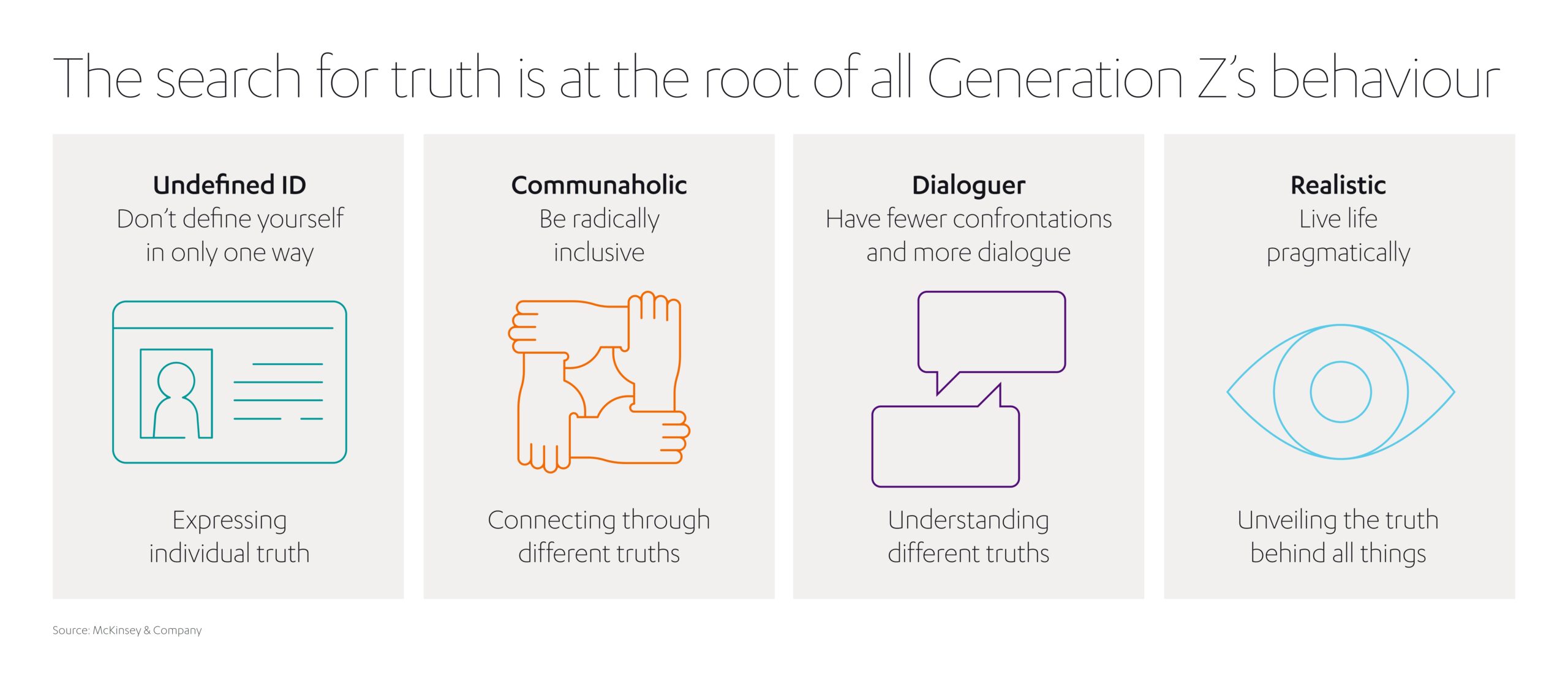
In another insight into the minds of Gen Z, a survey by the Top Employers Institute[4] found they look for stability, sustainability, and safety. Moreover, Gen Z wants employers to support their career journey while enabling a healthy life beyond work.
So, what does that mean in practice for businesses? Key priorities for Gen Z employees have been identified as:
- Providing development opportunities
- Making workplaces safer and healthier for employees
- Being financially stable as an employer
Interestingly, 62% of the respondents to McKinsey’s survey said they would accept less pay for a better work/life balance.
The International Journal of Science and Research (IJSR) notes that “Gen Z employees bring unique perspectives, expectations, and work ethics that differ significantly from their predecessors – Millennials (born 1981–1996), Generation X (born 1965–1980), and Baby Boomers (born 1946–1964)” [5].
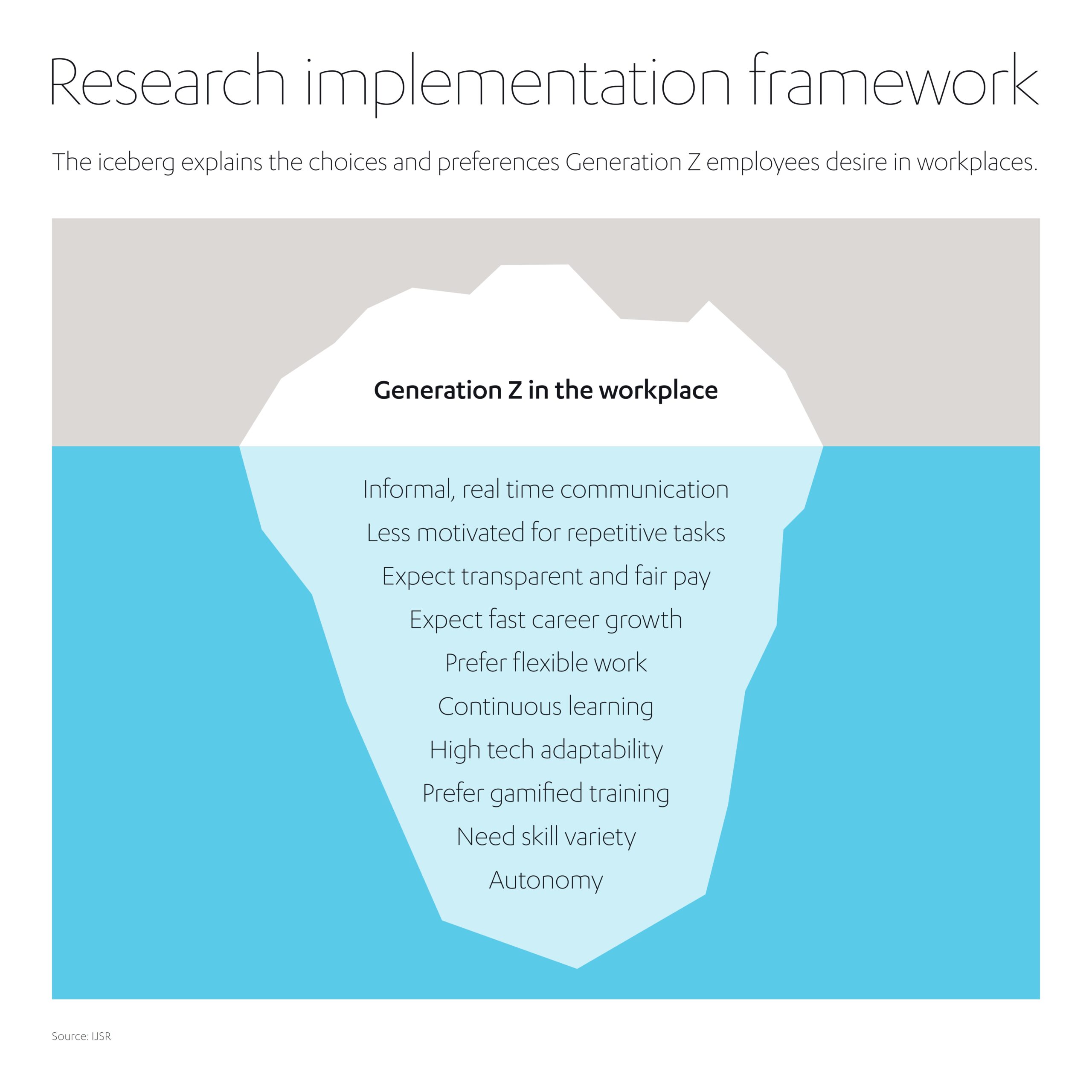
What are the key challenges facing employers?
While few would argue against these as sensible workplace policies, implementing them could be easier said than done for employers. For a start, achieving an acceptable work/life balance is a significant factor in Gen Z workplace priorities, but there is no ‘one-size-fits-all’ solution. Associated with this is the growing importance of mental health and what responsibilities employers should take in supporting their employees.
A survey by global consultancy Deloitte of the mental health of Gen Z and Millennials in a post-Covid world found that stress and anxiety remain at heightened levels. In particular, intense workloads and burnout were found to increase mental health issues[6].
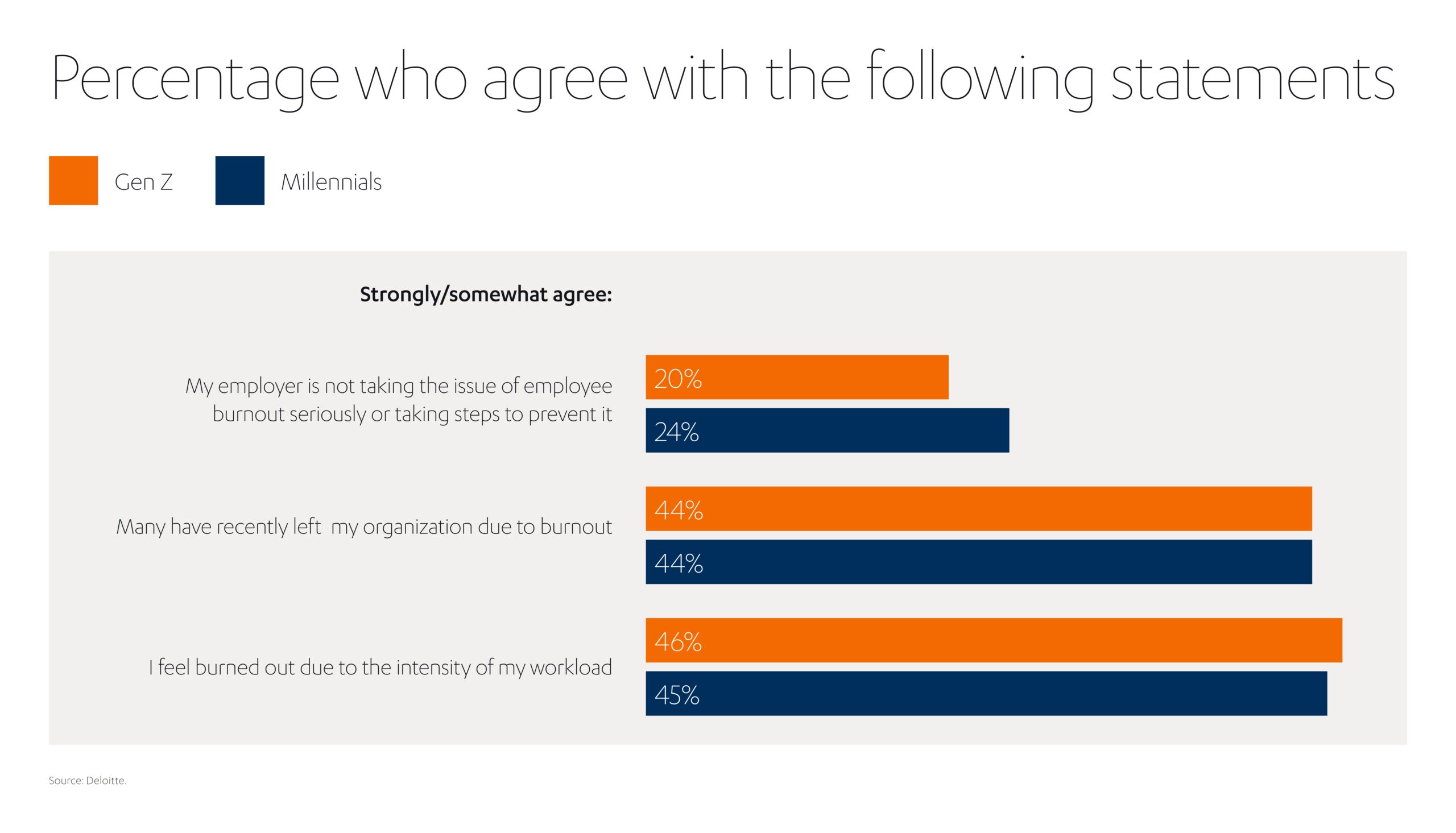
One outcome of workplace stress and job dissatisfaction is to ‘vote with your feet’ by leaving. Research by employment agency Manpower Group notes that at 47%, Gen Z employees were the most likely of all age groups who said they were going to voluntarily leave their current roles in the next six months[7]. However, they were also the least confident they would find jobs that met their needs.
This lack of confidence suggests that Gen Zers’ discontent about the workplace could be an opportunity for employers to act positively to attract them. Having Gen Z employees who want to leave but are unsure of next steps could be the ideal moment to implement workplace changes that convince them to stay.
How are employers responding to these issues?
In recruitment interviews with Gen Zers, an unprepared employer might be caught out by the candidate’s forthright job demands: ‘What are your ESG policies? Can I work flexibly? How inclusive is your workplace?’
There are multiple ways employers can adapt work practices to accommodate Gen Z; changes which could also benefit the wider workforce. Manpower Group’s research[8] highlights five key ways employers are responding to the challenges that Gen Z presents. These include:
- 73% of employers surveyed said they were looking at offering flexible work hours
- 73% considering higher levels of compensation
- 73% were looking at career development opportunities
- 75% were concentrating on wellbeing
- 76% thought improving technology tools was a priority
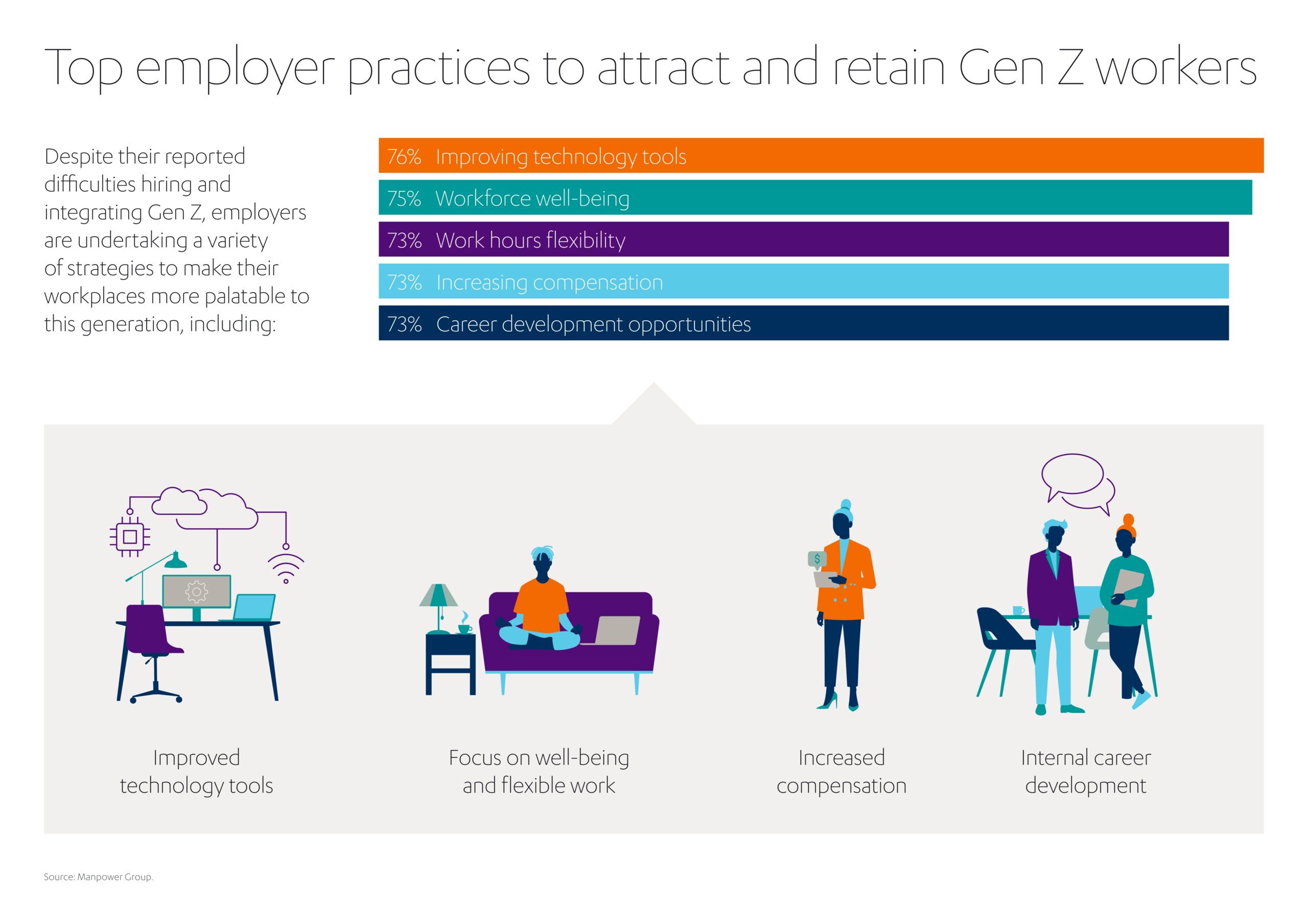
Similarly, experts at John Hopkins University[9] in the United States highlighted the benefits to employers of promoting their approach to issues such as:
- Mental health awareness
- Diversity and inclusion
- Career growth
- Better communication with Gen Z in forms they prefer, notably face-to-face (even if done online)
- Equal pay
- Environmental, Social and Governance (ESG)
ESG is a topical area where Gen Z has high expectations that their employers will take positive and permanent action. Around 60% of Gen Z and Millennials say they are anxious about the environment, with over half researching a brand’s environmental impact and policies before accepting a job[10].
Can hybrid working incentivize Gen Z employees?
The Covid-19 pandemic introduced flexible and hybrid working on a massive scale. The fact many employers today are finding it a challenge to coax people back behind their office desks suggests flexible working is here to stay. A recent study suggested that the 25-34 age group are among the most reluctant to return from hybrid to office working[11].
According to Deloitte, having a hybrid working arrangement is the preferred working arrangement for 63% of Gen Z employees. Yet this option is available to only 30% of them[12]. It might be a difficult balancing act for employers to handle between productivity and profitability goals on one side versus employee workstyle preferences on the other. But it is one employers might find is worth tilting in favor of employees.
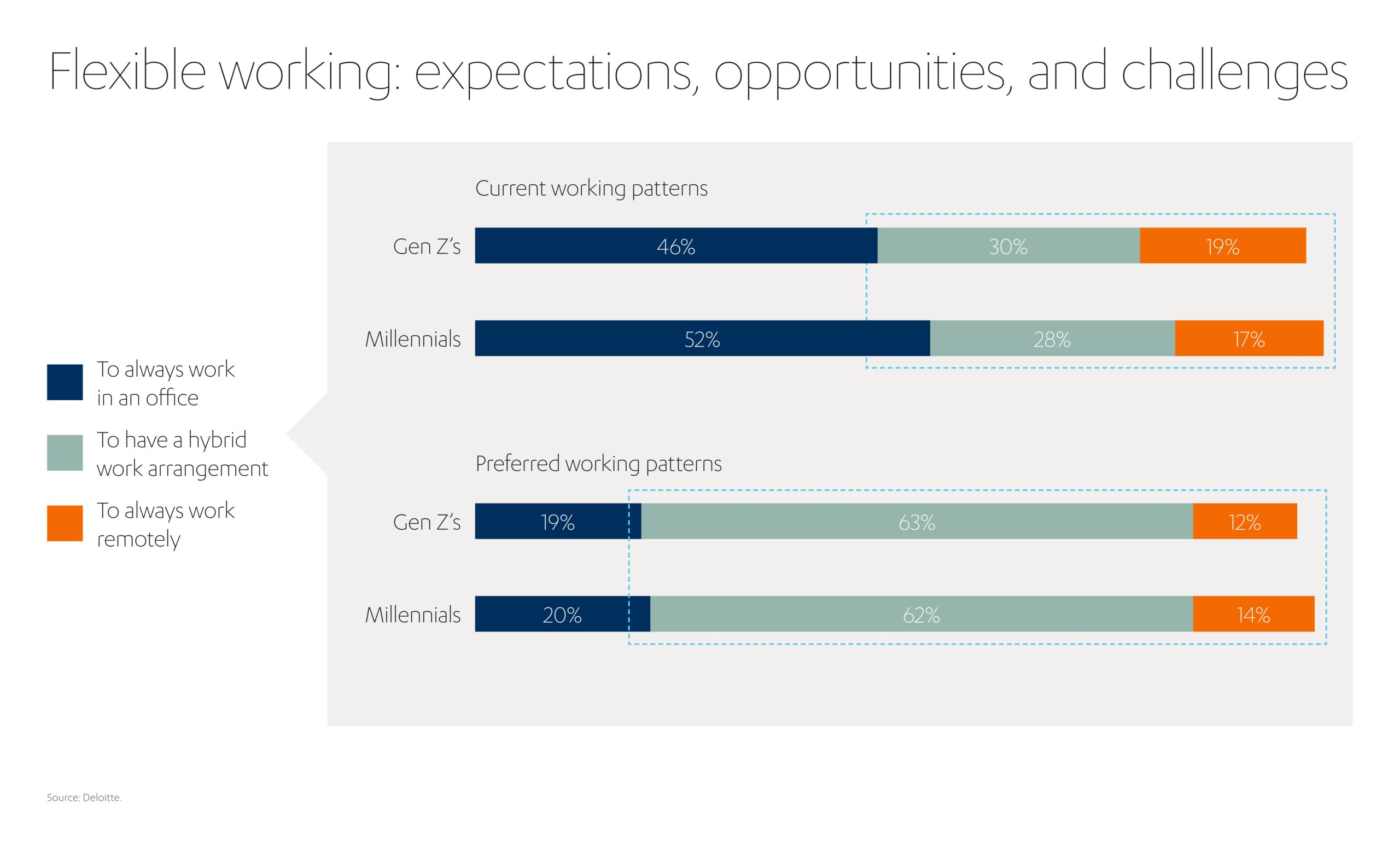
While Gen Zers clearly have strong ideas on what the world of work should provide them, they are also prepared to listen. In fact, many say they are keen to learn and follow the right type of business leaders[13].
Gen Zers are looking for leaders with emotional intelligence. They also expect communication to be a two-way street, with their voices being heard and their opinions valued by their employers. Initiatives like mentoring and job shadowing could be ideal ways for senior leadership to engage – and understand – Gen Z employees more effectively.
The rise to the top is already happening, with McKinsey finding that the number of Gen Z expressing a desire to reach C-suite level rising. In fact, Gen Zers are more than twice as likely to want to be a CEO compared with Gen X or Millennials[14]. So, companies need to be flexible now otherwise Gen Z talent may look elsewhere for career success.
What role can technology play in empowering Gen Z?
As so-called digital natives, could Gen Z be regarded as potential saviors of workplace productivity, utilizing their technology skills in ways colleagues from different generations may not have previously considered? The answer is both yes, and no.
A Google Workspace survey shows that 93% of Gen Zers who responded said they used two or more artificial intelligence (AI) tools on a weekly basis[15]. Leveraging AI in the workplace can help employers meet Gen Z priorities by improving their management capabilities (and with that, their promotion prospects), freeing up their time and improving communication, especially where there is hybrid working.
However, the sharing of technology know-how isn’t necessarily just in one direction. While it’s true Gen Z is generally tech savvy, just how much so may be less clear. In its 2024 Human Risk in Cybersecurity survey[16], EY experts highlight potential limitations to Gen Z technology capabilities. The survey suggests that “Gen Z is losing confidence in their ability to recognize phishing attempts – one of the most common and successful tactics of social engineering attacks – and is most likely to admit to opening a suspicious link”.
A case, perhaps, for work colleagues of different generations to support Gen Z on their own ‘territory’? It also demonstrates the importance for employers to understand the unique capabilities and challenges of Gen Z employees. That means taking an individual approach – something all employees are likely to appreciate as it shows a more personalized and caring attitude by the employer.
How is Abdul Latif Jameel addressing the needs of Gen Z in the workplace?
Abdul Latif Jameel has a keen interest in understanding Gen Z – part of its wider commitment to supporting a diverse, multigenerational workforce across its global operations. The challenge of attracting this key group of talented people is well appreciated across our workforce of over 11,000 people in more than 35 countries. Through initiatives led by our HR Center of Expertise, we look to standardize the recruitment process that appeal to a wide and diverse talent pool. Similarly, we continue to build on our Belonging & Inclusion’ agenda, with initiatives such as our female leadership development program to help diversify our workforce.
As well as upgrading our technology to facilitate remote and flexible working, we also focus strongly on cultural diversity. This is essential to ensure employees from some 80+ nationalities work together harmoniously.

In recent years, we have increasingly focused on bringing in Gen Z. This has required us to rethink what we offer in terms of career growth and flexible working, as well as in our CSR. Much of this comes down to our ethics and the purpose of our business. Indeed, as part of building and maintaining a strong corporate culture, in 2023 we launched ‘The Jameel Principles’, which set out the core value of our organization:
- Respect
- Improve
- Pioneer
- Empower
The Jameel Principles align closely with the aspirations of Gen Z regarding the types of business where they feel they can pursue a fulfilling career.
We believe the evidence is clear that companies which embrace gender diversity don’t just perform better – they innovate faster. Our culture of shared responsibility, epitomized by the not-for-profit activities of Community Jameel and Community Jameel Saudi, also resonates with what Gen Z expect from employers.
Striking the right balance: Gen Z and the multigenerational workforce
While companies are changing their approaches in many of the ways that Gen Z value, there is evidence of a mismatch between employer actions and Gen Z preferences. A report by HR software firm Cangrade[17], for example, found that 26% of Gen Z say they are unhappy at work, with 17% thinking of leaving their jobs.
Some research also highlights transitional challenges. One survey[18] found that three-quarters of managers didn’t think Gen Z recruits integrated into teams as easily as employees from other generations. In fact, nearly half of the managers polled said they found Gen Z more difficult to manage either most or all of the time.
One potential challenge of prioritizing Gen Z’s needs is the possibility of overlooking the perspectives of other generations within the workforce. Generation Alpha (people born from 2013 to 2024) will be joining the workforce before too long, bringing their own job expectations. By then, some Gen Z workplace norms could be superseded by the demands of a new generation of recruits.
How can we secure a mutually beneficial future?
Unsurprisingly, the most comfortable position for employees and employers is probably the middle ground. Compromise might be inevitable when employing Gen Z, but that needn’t mean a less satisfactory long-term outcome for companies or their employees.
Encouragingly, EY’s 2024 Work Reimagined Survey[19] points to positives in the future shape of workplaces. The firm observes that “the global workforce has evolved into one with personalized experiences and expectations, increasingly disconnected from one-size-fits-all ideas of career, total rewards and work location”.
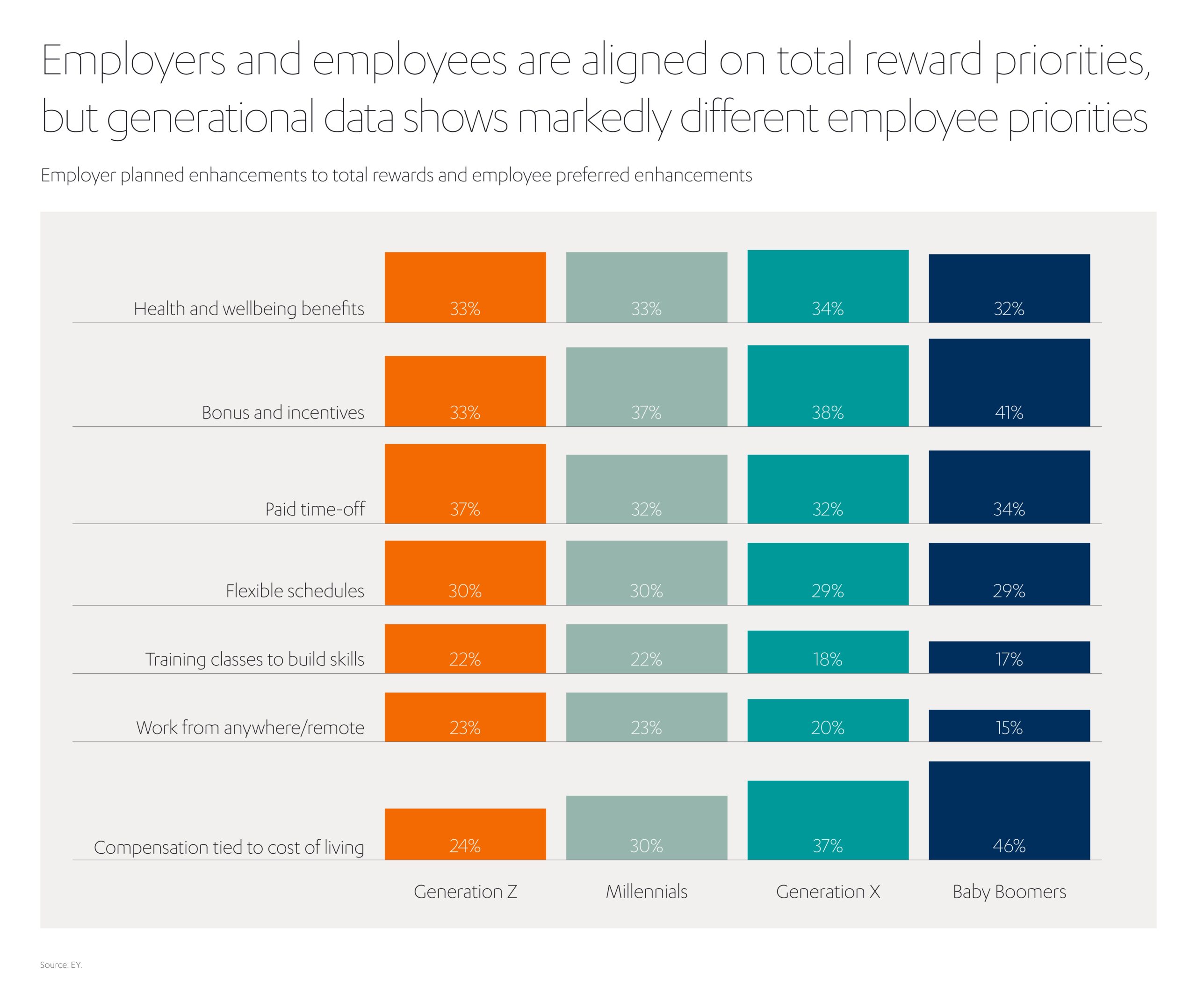
The impetus is on employers to find the most influential rewards enhancements that cut across workforce demographics. That way, a win-win situation could be achievable. One where Gen Z feels it fits in the workplace and where other employees don’t feel left out.
The goal is a workplace where Gen Z feels they belong, and all employees feel valued – creating an energized environment where everyone contributes meaningfully
Gen Z in the workplace: Five fast facts
-
What percentage of the workforce in OECD countries is Gen Z in 2025?
It’s estimated that 27% of the workforce in OECD countries is Gen Z in 2025. -
How do Gen Z career ambitions compare to previous generations?
Gen Z are more than twice as likely to want to be a CEO compared with Gen X or Millennials -
What percentage of Gen Z prefer hybrid working arrangements?
63% of Gen Z employees prefer hybrid working arrangements, but this option is only available to 30% of them. -
What are the core values Gen Z seeks in employers?
Gen Z seeks workplaces that value individual expression, are inclusive, avoid confrontation, and act analytically and pragmatically. -
How do ‘The Jameel Principles’ align with Gen Z values?
The Jameel Principles of Respect, Improve, Pioneer, and Empower align closely with Gen Z’s aspirations for businesses where they can pursue fulfilling careers. These values resonate not only with Gen Z but also with employees across all generations.
[1] https://www.weforum.org/stories/2022/05/gen-z-don-t-want-to-work-for-you-here-s-how-to-change-their-mind/
[2] https://www.mckinsey.com/industries/consumer-packaged-goods/our-insights/true-gen-generation-z-and-its-implications-for-companies
[3] https://www.deloitte.com/gr/en/issues/work/genz-millennial-survey-2025.html.
[4] https://www.top-employers.com/blog/gen-z-redefining-the-future-of-work/
[5] https://www.ijsr.net/archive/v14i3/SR25316115930.pdf
[6] https://www2.deloitte.com/content/dam/Deloitte/global/Documents/deloitte-2022-genz-millennial-mh-whitepaper.pdf
[7] https://www.manpowergroup.co.in/whitepaper/MPG-Gen-Z-White-Paper-2025.pdf
[8] https://www.manpowergroup.co.in/whitepaper/MPG-Gen-Z-White-Paper-2025.pdf
[9] https://imagine.jhu.edu/blog/2023/04/18/gen-z-in-the-workplace-how-should-companies-adapt/
[10] https://www.deloitte.com/cbc/en/services/risk-advisory/blogs/gen-z-and-millennial-survey.html
[11] https://www.peoplemanagement.co.uk/article/1902075/third-25-34-year-olds-quit-forced-back-office-study-finds
[12] https://www2.deloitte.com/content/dam/Deloitte/global/Documents/deloitte-2022-genz-millennial-mh-whitepaper.pdf
[13] https://www.top-employers.com/blog/gen-z-redefining-the-future-of-work/
[14] https://www.mckinsey.com/~/media/mckinsey/email/genz/2023/06/2023-06-20b.html
[15] https://workspace.google.com/blog/ai-and-machine-learning/rising-leaders-embrace-ai-new-research-google-workspace-and-harris-poll
[16] https://www.ey.com/en_us/newsroom/2024/05/ey-2024-human-risk-in-cybersecurity-survey
[17] https://www.cangrade.com/blog/hr-strategy/what-you-should-know-about-generational-happiness-at-work-research/
[18] https://www.resumebuilder.com/3-in-4-managers-find-it-difficult-to-work-with-genz/
[19] https://www.ey.com/en_gl/insights/workforce/work-reimagined-survey





 1x
1x

 Added to press kit
Added to press kit


